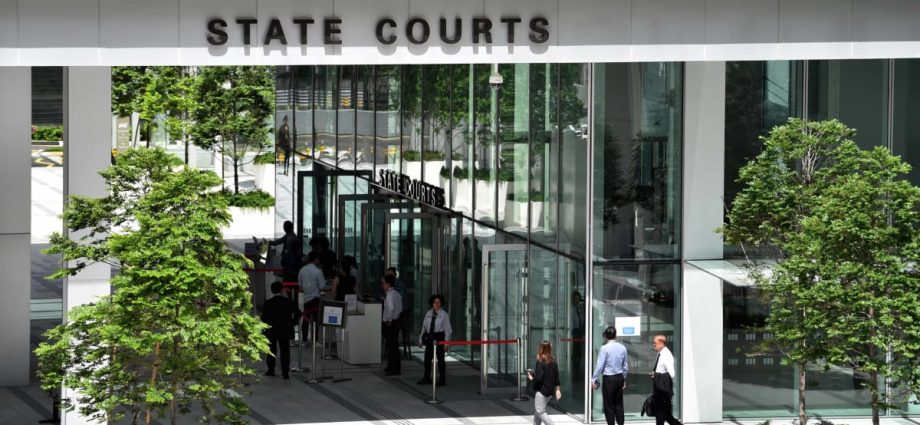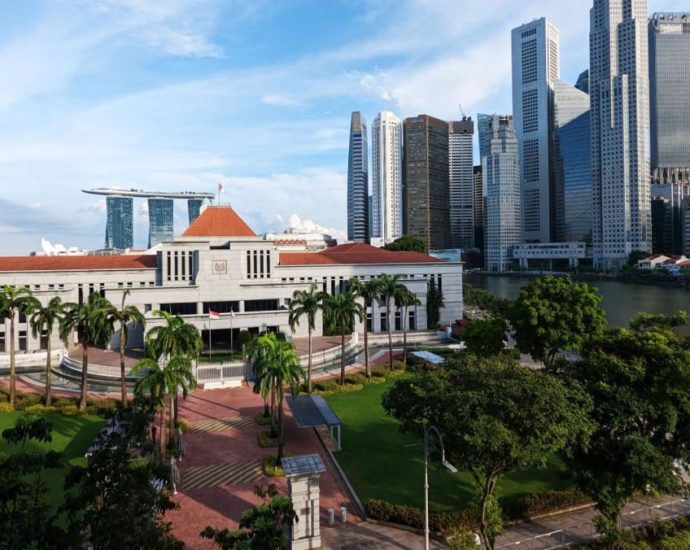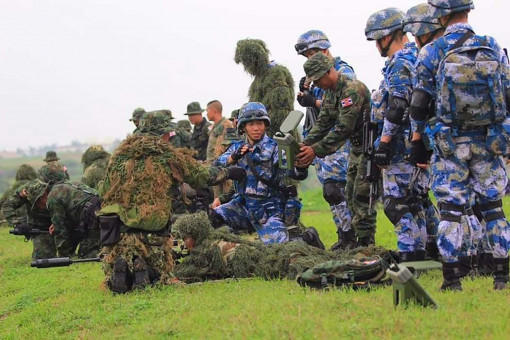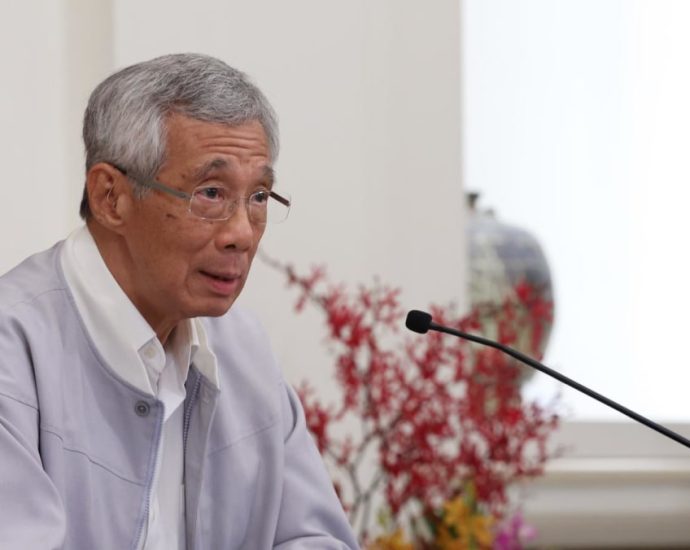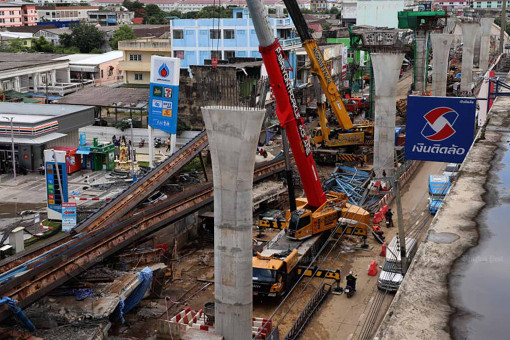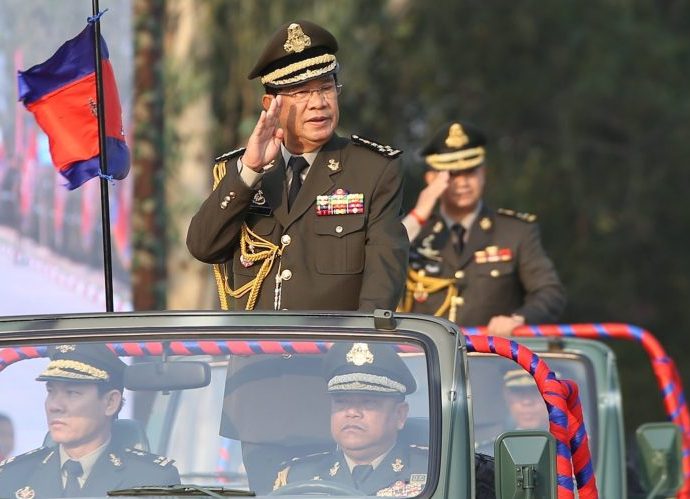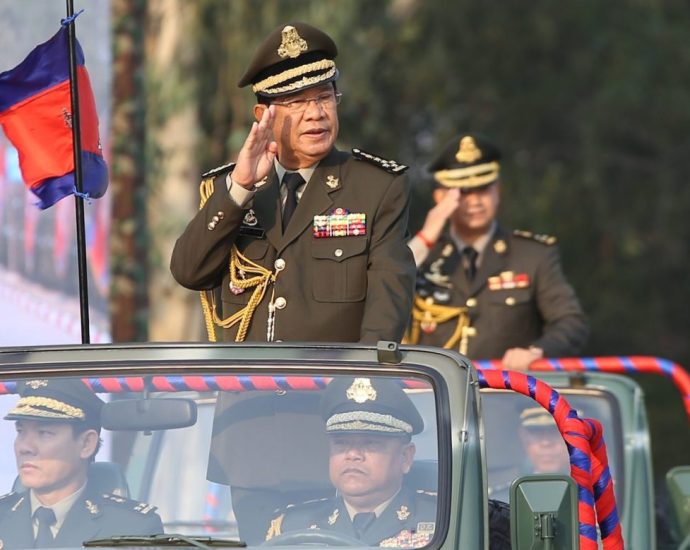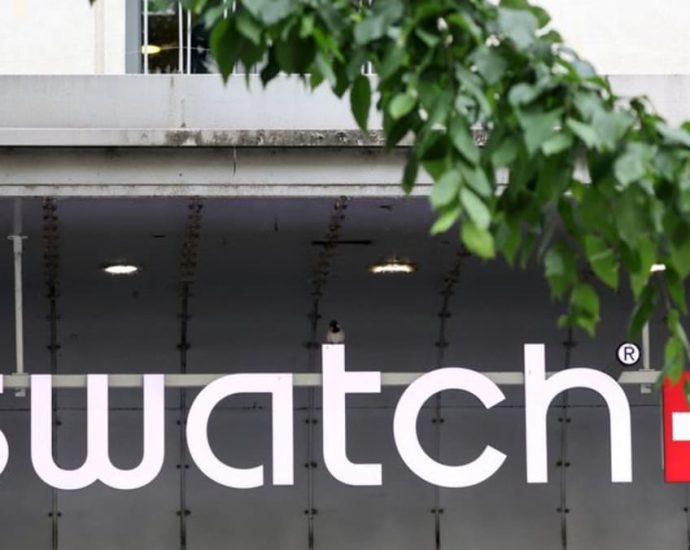Woman cheated victims of S$1.39 million in investment scams, evaded police for 10 years
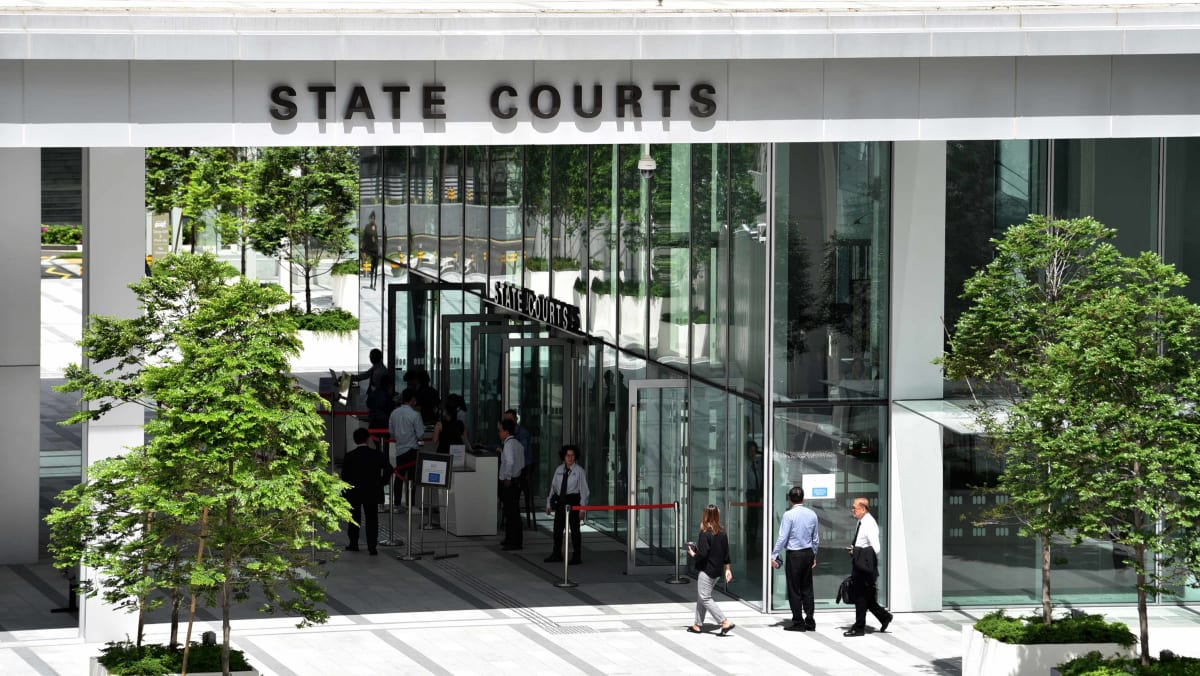
SINGAPORE: A woman cheated multiple victims of S$1.39 million (US$1.05 million) in investment scams, including her own “godson” and a property agent she was working for.
She then evaded the police for about 10 years, moving from place to place and continued to reoffend, until she went to the Institute of Mental Health (IMH), following a suicide attempt.
Low Mood Chay, 66, was sentenced to seven years’ jail on Monday (Jul 17) for her crimes.
She pleaded guilty to four counts of cheating, with another seven charges taken into consideration.
The court heard that Low, who is also known as Christy or Lowe, first targeted a 55-year-old property agent at Propnex Realty whom she was working for.
Low was the agent’s personal assistant and part-time telemarketer from April 2011, and helped the agent secure a few deals.
The property agent grew to trust Low as a friend. In July or August 2011, Low told the agent about a purported investment scheme which guaranteed yielding dividends of up to 18 per cent per annum.
Low claimed that this scheme was administered by the “AFIG Investment Company”, which was based overseas and gave benefits under its membership programme, including free cars or houses.
Low told the agent that she was a director of AFIG. In order to become members, applicants had to invest large sums of money into the supposed scheme.
The agent was interested in joining the programme for its benefits and began handing large sums of money to Low from late 2015 for this purpose.
She even allowed Low to rent a place together with her for five years, so that Low could “mentor” her closely to pass a test to qualify as AFIG’s property agent in Singapore.
Low got the agent to invest more sums by telling her that she had failed to join the programme, adding that she would lose all capital if she stopped now.
In total, the agent was cheated of S$274,500 and resorted to borrowing money from friends, family and loansharks.
Low also cheated a 34-year-old freelance tutor whom she worked for as an administrator.
The pair grew close enough to be like godmother and godson, the court heard.
Low lied to him that she was affiliated with “many rich and powerful people”, including the owners of Hong Leong Bank, a lawyer named Keith Ong and a UBS relationship manager.
She plied him into “investing” into a special scheme which she claimed to have access to due to the special relationship she had with Hong Leong Bank’s owners.
Low duped her “godson” into giving her S$1.01 million between 2020 and 2021. Of this sum, she returned him about S$291,000 that she claimed were “dividends” – meaning he suffered a net loss of about S$771,000.
Low also cheated another employee at the tuition centre her “godson” worked at, lying to her that she was a rich businesswoman with companies in the United States and New Zealand.
She also lied that she was good friends with a “former minister of Singapore” and with the owners of UBS.
This victim lost S$36,830 after being lured into the fake “investments” cooked up by Low.
EVADED POLICE FOR A DECADE
Low would use some money from one victim to pay off some promised dividends to another victim, and splashed the cash on jewellery and branded goods.
She did not make any restitution.
After the first police report for cheating was lodged against Low in 2010, she was identified for investigations and gave a statement to the police.
However, the police could not find her again when they wanted to produce her in court.
A police gazette was issued against her in March 2012.
Low evaded the police for about a decade by not staying at her registered address. She rented different places to live in, moving in with the property agent for five years, before staying with her “godson”.
However, after the agent lodged a police report of her own in 2018, the police identified and froze Low’s bank account, which she was using to receive funds.
On Dec 12, 2021, Low attempted suicide by inhaling smoke from burnt charcoal.
She was living with her “godson” and the other tuition centre employee at the time. Both victims did not know of her crimes at the time.
The tuition centre employee convinced Low to admit herself to IMH.
While she was there, the two victims discussed the matter and realised that Low had been cheating them. They lodged police reports against her, and the police finally arrested Low while she was in IMH.
Low was remanded and listened to the hearing from her place of remand.
Deputy Public Prosecutor Tay Jia En sought a sentence between six-and-a-half years and seven years and eight months for Low.
He said the courts have recognised the increasing number of investment scam cases, a persistent and worrying trend that must attract “suitably stiff” sentences.
He also pointed to the large amount of money involved, the multiple victims targeted and the lengthy period of criminal conduct.
Eight new NMPs to be appointed, Raj Joshua Thomas to serve second term
SINGAPORE: Eight fresh faces are set to be appointed as new Nominated Members of Parliament (NMPs), while lawyer Raj Joshua Thomas will return for a second two-and-a-half-year term. The nine names were released by the Office of the Clerk of Parliament on Monday (Jul 17). They will be appointed by PresidentContinue Reading
Thailand, China holding 3 joint military exercises
PUBLISHED : 17 Jul 2023 at 14:13

Thailand and China are holding three joint military exercises involving their air forces, armies and navies, from July to September, a military source said.
The first began on July 9 – an annual joint air combat exercise “Falcon Strike 2023”, intended to strengthen cooperation between the Thai and Chinese air forces to uphold regional peace and stability. The opening ceremony was at the air force base in Udon Thani. The exercise will continue until July 21.
The Falcon Strike exercise was first held in 2015 and then in 2017, 2018 and 2019 before a break due to the Covid-19 outbreak.
Thai aircraft taking part in the 2023 exercise include the Gripen 39 C/D, Alpha Jets and Saab 340 AEW fighters. China has sent J-10C/S, JH-7 A/AII ,J-11B/S and KJ-500 fighters.
Under an agreement between the Thai and United States air forces, the RTAF’s F16 and F5 fighters are not allowed to take part in a joint exercise with China.
From Aug 16 – Sept 2, special warfare units of the Thai and Chinese armies will take part in the Joint Strike 2023 exercise in Lop Buri province.
Blue Strike, a joint exercise involving both navies, is planned from Sept 3-10 in Chon Buri, Rayong and Chanthaburi provinces in the East. The exercise is held every two years, with the two countries taking turns as host.
On Aug 31, Chinese warships and amphibious landing ships will arrive at Sattahip in Chon Buri province.
A Thai navy source said this year’s exercise would be carried out quietly due to the tension between China and the US in the South China Sea.
China faces structural mismatch in labour market as interest in manufacturing falls, amid record high youth unemployment
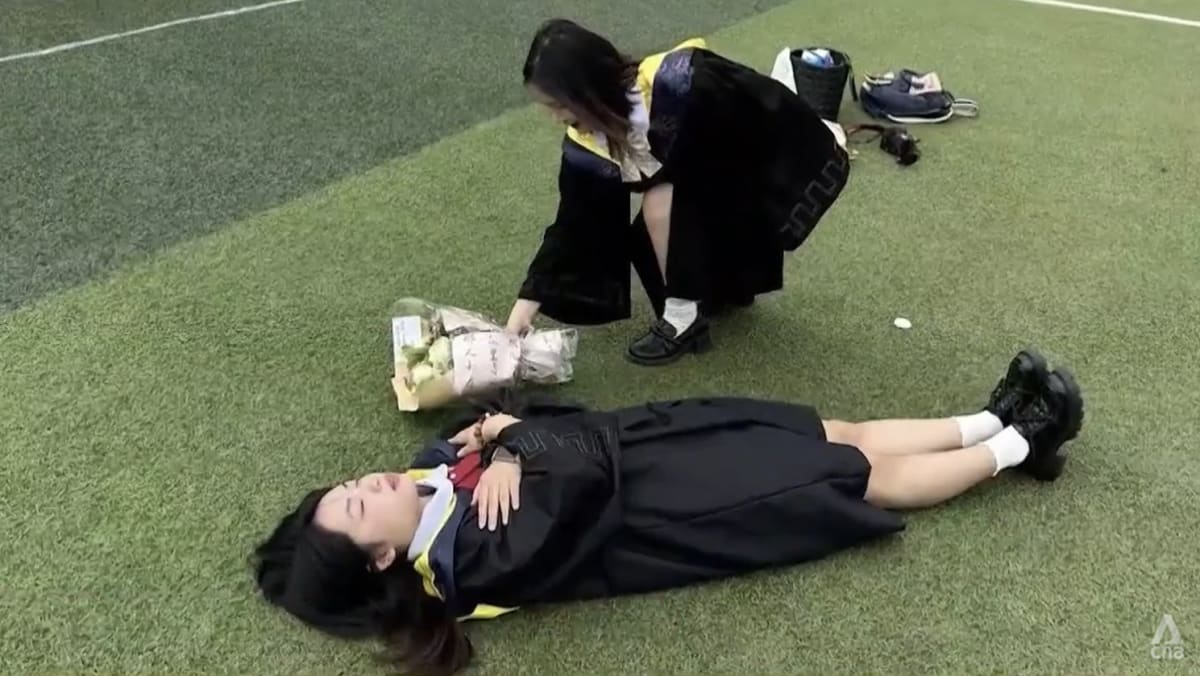
As the country transitions towards becoming a developed economy, fewer youths want to enter the manufacturing sector, which could lead to shortage of workers in the industry in the future.
Professor Zhang Jun, dean of the School of Economics at Fudan University, said that China is facing a long-term low wage problem. One way to address the labour mismatch, he said, is for wage growth to be linked to nominal GDP growth.
STRUGGLING TO LAND FIRST JOB
Posing as corpses in graduation gowns is a new trend among graduates on social media, as college graduation season sweeps through China.
According to the youth, it reflects the mood of their generation and the challenges faced in finding a job.
Mr Zhang Tao, a telecommunications engineering graduate from Chongqing College of Mobile Communications, told CNA: “This cohort of graduates is very large, and it’s a bit difficult to find employment at the moment.”
“The most popular buzzword is ‘involution’. Because many people around you are definitely competing intensely, which may bring a sense of unnecessary anxiety. So perhaps these photos are one way to let go and relax,” said Mr Yang Zhihao, an applied physics graduate from South China University of Technology.
Tan Chuan-Jin, Cheng Li Hui continued âinappropriate relationshipâ even after being told to stop: PM Lee

SINGAPORE: Former Speaker of Parliament Tan Chuan-Jin had been in an “inappropriate relationship” with fellow People’s Action Party (PAP) Member of Parliament Cheng Li Hui, which continued even after they were asked to stop, said Prime Minister Lee Hsien Loong on Monday (Jul 17).
Mr Tan and Ms Cheng resigned from parliament and the PAP earlier on Monday.
In opening remarks a press conference held the same day, Mr Lee said he had spoken to Mr Tan about this relationship most recently in February. The latter admitted his mistake and offered his resignation at the time.
“I had accepted his resignation,” said Mr Lee. “But I told him, first, I needed to make sure the residents of Kembangan-Chai Chee and Marine Parade continued to be taken care of.
“Meanwhile his relationship with Ms Cheng had to stop.”
But “very recently”, Mr Lee came across information that “strongly suggested” that Mr Tan and Ms Cheng’s relationship had continued.
“I decided then that Mr Tan had to go forthwith, whether or not the arrangements were ready. It could not wait any longer.”
Around the same time, the video clip of Mr Tan caught on a hot mic using unparliamentary language was circulating.
“I asked to see him,” said Mr Lee. “During our discussion, he agreed to leave immediately – both for his unparliamentary conduct as well as his inappropriate relationship with Ms Cheng, which he had told me he would break off but he did not.”
Their inappropriate relationship was a “more serious matter” than Mr Tan’s unparliamentary language because he was the Speaker of Parliament and Ms Cheng was a Member of Parliament, said the Prime Minister.
“There should not have been a relationship,” he added.
Carbon-free flights promised ‘within two years’
 ZeroAvia Aviation
ZeroAvia AviationAn aviation company plans to run commercial flights using an electric engine that creates no carbon emissions by 2025.
ZeroAvia has flown nine test flights with its hydrogen-electric engine at Cotswold Airport, near Cirencester.
The only emission created by the engine is water.
Sergey Kiselev, Vice-President of ZeroAvia, said the engine would help achieve “the decarbonisation of aviation”.

Many other aerospace firms are developing engines that run on hydrogen, but most are not expecting to fly commercially until 2035. So how have they done it, and could it be possible to fly without causing climate change much sooner than people had thought?
How does it work?
The Gloucestershire-based company are moving much faster because they are not designing an entirely new aircraft.
ZeroAvia is working on the Dornier 228, a conventional 19-seater plane that has two propellers, usually powered by kerosene.
One of these has been replaced by an electric engine, and the electricity is generated on-board using a hydrogen fuel cell. For the testing period, the other engine remains fuelled by kerosene, in case of failure.
But once the technology is proved, both engines will run on electricity from the hydrogen fuel cell.
Only the new engine needs to pass safety tests, and the company is working with the Civil Aviation Authority to achieve certification.

Test pilot Jon Killerby flew the aircraft and told me that once airborne, they have managed without the kerosene engine.
“We can throttle right back on the conventional engine,” he said, “and fly purely on the hydrogen electric system, it generates enough thrust to fly the aircraft level.
“It really is amazing how well it works.”
Is it really ‘green’?
Hydrogen fuel cells are not new, and have been widely used in cars and trucks.
They use a chemical process called “reverse hydrolysis” which combines hydrogen with oxygen and creates heat, water vapour and, crucially, electricity.
So the on-board engine creates no greenhouse gases.
But what matters is where you get your hydrogen.
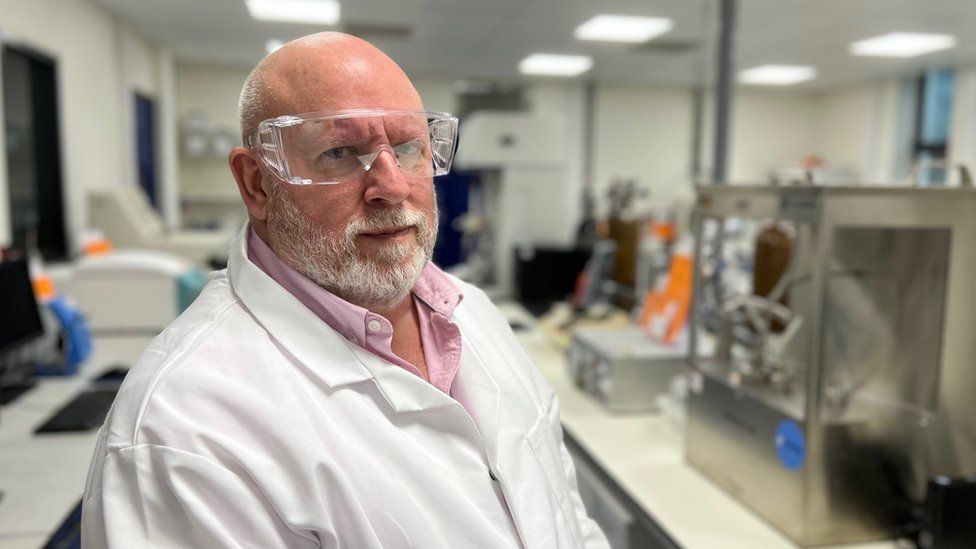
At Bath University, Prof Tim Mays has been studying hydrogen for thirty years. He runs the UK Hydrogen Research Hub which has just been awarded £11m to explore how hydrogen can help combat climate change.
He explained: “At the moment people make it by treating natural gas with steam, which is about as unsustainable as it gets.”
But it is also possible to use electrolysis to split water into hydrogen and oxygen, using renewable electricity.
“That makes green hydrogen, which is what the aviation industry needs,” said Prof Mays.
“It’s a really serious option, because we do need to replace kerosene.”
How big, how far?
It is not a big plane.
The Dornier 228 will carry about 12 passengers with the hydrogen engine on board.
It can fly about 250-310 miles (400-500km), according to Chief Commercial Officer Sergey Kiselev.
That would get you from Bristol Airport to Newcastle, or London to Paris.
By 2027, the company plans a larger hydrogen-electric engine which would power bigger aircraft. This could carry around 50 passengers and go nearer to 620 miles (1,000 km).
What are the problems?
“Like all technologies, there are challenges,” smiles Prof Mays.
“Making it, transporting it, and storing it.”
The aviation industry needs to build an entirely new infrastructure. Hydrogen production centres, a network to get the fuel to airports, storage at airports, the lot. And hydrogen is very different from conventional kerosene.
Hydrogen takes up a lot of space. To carry it all manageably, the gas is compressed to 350 or 700 times atmospheric pressure.
Even then, it takes up more space than kerosene. If you want to transport it as a liquid, you must first chill it to 253 degrees below zero.
So exactly where to make it, how to move it around and store it are all being examined now by airports and aerospace firms.
Prof Mays put it like this: “You can fly using hydrogen as a fuel, but it is not optimised, not super efficient yet, and the infrastructure is not there yet.”
Will airlines use hydrogen?
The hangar in the Cotswold Airport is small, and far from the big research labs of Airbus, Rolls Royce and Boeing.
But ZeroAvia already has orders for more than 1,500 of its first engine.
Air Cahana is one, a new Californian airline with “a mission to decarbonise aviation“.

Another early customer is closer to home, the environmental entrepreneur Dale Vince, who founded renewable energy firm Ecotricity.
Mr Vince is launching an airline called “Ecojet”, which will use the ZeroAvia engines on passenger flights, at first from Edinburgh to Southampton.
He said: “The question of how to create sustainable air travel has plagued the green movement for decades.
“The desire to travel is deeply etched into the human spirit, and flights free of C02 emissions, powered by renewable energy will allow us to explore our incredible world without harming it for the first time.”

Bigger aerospace firms are watching the small start-up with interest. Airbus has a huge research programme called ZeroE, which also uses hydrogen. The company is exploring both hydrogen fuel cells to create electricity to power propellers, and using liquid hydrogen directly for combustion.
But Airbus is aiming to have hydrogen-powered planes in the sky by 2035, a full decade later than the small ZeroAvia engines.
Sergey Kiselev told me that’s why they decided not to create a completely new aircraft, but instead just change the engine on an existing plane.
He said: “It helps us eliminate all the complexity with the certification of the aircraft, we can focus only on the engine. So we can get the aircraft up into the air in commercial operations, much faster.”
The company has made its pledge. It now has at least two big challenges.
One is to make its engine safe, certified, and ready to use by 2025.
They are well on their way to that one.
The other, harder, challenge, will be making sure there is some fresh new hydrogen waiting for the aircraft when it lands at the other end.

Follow BBC West on Facebook, Twitter and Instagram. Send your story ideas to: [email protected]
Related Topics
Luang Phaeng road reopens to traffic
PUBLISHED : 17 Jul 2023 at 12:04

Luang Phaeng road in Lat Krabang district, closed after part of a traffic overpass under construction collapsed on July 10, was reopened to vehicles on Monday morning, Chorakhe Noy police said.
From 5am, one inbound and two outbound lanes of Luang Phaeng road were reopened for buses and vehicles with up to six wheels.
However, vehicles must still detour through the area under the 500-metre-long collapsed segment of the 2.2-kilometre-long Onnut-Lat Krabang elevated road, which is still being cleared of debris.
Traffic was moving smoothly along Luang Phaeng road after the reopening, police said.
The centre set up in the nearby Lotus department store parking lot for people affected by the collapse to report their issue to authorities has been closed. People can still report their problem to the Lat Krabang district office during office hours.
Two people died and 10 others were confirmed injured when the overpass collapsed between the Lotus Lat Krabang branch and Jorakay Noi police station.
Leaked peek at Cambodiaâs post-election, new-gen roster
Cambodia will undergo monumental “generational succession” after next weekend’s general election, with Prime Minister Hun Sen set to step down after almost four decades in power and be replaced by his eldest son Hun Manet, according to leaked official documents seen by Asia Times.
Apart from Hun Sen’s own dynastic succession, which will see Hun Manet, 45, take over as prime minister, the sons of powerful Interior Minister Sar Kheng and Defense Minister Tea Banh will also inherit their fathers’ jobs, according to the leaked lists.
Of 30 cabinet posts, there will purportedly be 23 new ministers when the next cabinet is formed, which Hun Sen has said will happen by the end of August. All but one of the ten incumbent deputy prime ministers will retire, according to the same leaked lists.
Many, like Hun Manet, are in their 40s and the children of retiring ruling party grandees. However, analysts told Asia Times that there are many competent and compelling appointees on the list, an indication that the inchoate Manet administration will attempt to build a technocratic governance image.
The Interior Ministry will be inherited by Sar Kheng’s son, Sar Sokha, 43, who is currently a secretary of state at the education ministry and head of Cambodia’s football association. Tea Seiha, 42, the governor of Siem Reap province, will take over the defense ministry from his father, according to the leaked lists.
Vongsey Vissoth, an experienced minister attached to the prime minister’s office and a permanent secretary of state of the finance ministry, will become the new Minister in Charge of the Office of the Council of Ministers, an important post that decides when the cabinet meets and what it discusses. He will likely ensure Hun Sen maintains an active role in future cabinet meetings.
Sok Chenda Sophea, secretary-general of the Council for the Development of Cambodia, a body that assesses foreign investment, is expected to become the next foreign minister.
Some old faces will remain, including Finance Minister Aun Pornmoniroth, 57, who will apparently be the only deputy prime minister who keeps that position. Ing Kantha Phavi, the women’s affairs minister since 2004, will also keep her job, according to the leaked lists.
The ruling Cambodian People’s Party (CPP), in power since 1979, is assured victory at the July 23 general election after having banned its only viable challenger from competing in the ballot.
It is projected to win the vast majority, if not all, seats in parliament, just as it did at the last general election in 2018 after banning its Cambodia National Rescue Party (CNRP) rival. All efforts are now being made to ensure high voter turnout to provide a veneer of legitimacy for the succession plans.

Hun Manet has featured prominently in the CPP’s campaign rallies, where on at least one occasion he was handed the ruling party’s flag by his father in a symbolic and public gesture as the campaign got underway earlier this month.
For almost a decade, Hun Sen, 70, has meticulously planned his dynastic succession.
In 2018, Hun Manet was appointed army chief and deputy commander in chief of the Royal Cambodian Armed Forces. The CPP’s Central Committee approved him as the party’s future prime ministerial candidate in late 2021.
In April, Hun Manet temporarily stepped down from the military so he could run for parliament at the July 23 election.
Hun Sen has said he will remain CPP president after resigning as prime minister, a post that will allow him to continue to dictate policy and personnel choices.
Because of constitutional amendments that he rushed through last year which weakened the National Assembly’s ability to choose a prime minister or censure a minister, Hun Sen will now have even more power.
It was previously unclear when Hun Sen would actually step down. Some commentators suspected this at some point in the mid-term before the 2028 general election. However, it now appears that he has at least made preparations to depart before the next cabinet is formed.
The leaked lists were spread on social media last weekend by accounts associated with Cambodia’s now-banned opposition parties, raising suspicions that they may have been faked.
However, Asia Times spoke to several government and diplomatic sources who said the names and positions tally with information they have also been provided. It also chimes with details that have leaked over the past 12 months.
For instance, this writer heard last year that another of Hun Sen’s sons, Hun Many, 40, was tipped to become minister of the civil service, which the leaked lists confirm.
In order to sell his own son’s rise to the top job, it is believed Hun Sen pledged that a “generational succession” would also take place, in which the children or relatives of all grandees would rise through the ranks.
According to the leaks, Eang Sophalleth is tipped to become environment minister. He is the son-in-law of Chea Sophara, an outgoing deputy prime minister and land management minister.
Cham Nimol, a secretary of state at the commerce ministry, will become commerce minister. She is the daughter of former commerce minister Cham Prasidh.
The children of deceased party grandees will also get promotions. Sok Soken, a son of Sok An, a longtime close ally of Hun Sen and former minister in charge of the Council of Ministers, is purported to become the next tourism minister.
Meanwhile, Chea Somethy, a son of the late Chea Sim, a former CPP president, is expected to be named Minister for Social Affairs, Veterans and Youth Rehabilitation.
A number of the appointees are Hun Manet’s closest aides, including Heng Sour (tipped to be labor minister) and Huot Hak (minister for National Assembly-Senate relations). Many of them are affiliated with Hun Manet through the ruling party’s youth wing, of which he was made president in 2020.

Chay Borin, a parliamentarian from Tboung Khmum province, is being lined up as religion minister seemingly because of his close association with Manet within the CPP youth organization (Khmer-language press have referred to him as Manet’s “representative.”)
Importantly, a clean sweep of deputy prime ministers also appears likely. Of the current 10 politicians who hold that rank, only Finance Minister Aun Pornmoniroth will stay on, according to the leaked lists.
The likes of Sar Sokha and Tea Seiha are listed as incoming deputy prime ministers. So, too, are National Police Chief General Neth Savoeun and Sun Chanthol, the apparently outgoing minister of public works.
There will be more continuity among the permanent ministers, who lack cabinet portfolios but are tasked with special projects.
Those who are forecast to remain in their posts include Kun Kim, Ho Sithy, Om Yentieng, Ieng Moly, Islam Hassan and Ly Thuch. Incoming permanent ministers include Pich Sophorn, a secretary of state at the labor ministry; Prum Sokha, a secretary of state at the Ministry of Public Service; and Ouk Rabun, the current minister of rural development.
Analysts who spoke to Asia Times on the condition of anonymity said they had expected patronage appointments in the lists, which are necessary to balance the influence networks within the party.
Had the Hun family gained too much power and not divided the spoils of dictatorship among most of the important political families, it might have bred intra-party tensions and potentially a rival to Manet for the top job, they said.
However, they added that there appear to be genuine technocrats among the appointees. One analyst who saw the list said they were impressed that, in the more technical ministries, the CPP appears to be prioritizing competence over loyalty.
If the list is legitimate, Chheang Ra, who is currently director general of Calmette Hospital, the capital’s flagship public hospital, will become the new health minister. Keo Rattanak, secretary general of state-run electricity utility Electricite du Cambodge, will become minister for energy and mines.

The expected future minister of rural planning is Chhay Rithysen, an engineer who studied at America’s elite Massachusetts Institute of Technology and is currently director general at the General Department of Land Management and general secretary of the ministry’s Board of Architects.
Even when there’s nepotism clearly involved, that doesn’t mean that the new generation appointees necessarily lack talent.
Most commentators would agree that Dith Tina – the 44-year-old son of Supreme Court chief Dith Munthy, who forcibly banned the CNRP in 2017 – has excelled since last year becoming agricultural minister, a post he is expected to keep. So, too, is the competent Koeut Rith, who has been justice minister since 2020.
Cham Nimol has held various positions at the commerce ministry since her early 20s, at a time when her father, Cham Prasidh, was the minister. If she becomes commerce minister, at least the 43-year-old would have had almost two decades working within the ministry.
Follow David Hutt on Twitter at @davidhuttjourno
Leaked peak at Cambodiaâs post-election, new-gen roster
Cambodia will undergo monumental “generational succession” after next weekend’s general election, with Prime Minister Hun Sen set to step down after almost four decades in power and be replaced by his eldest son Hun Manet, according to leaked official documents seen by Asia Times.
Apart from Hun Sen’s own dynastic succession, which will see Hun Manet, 45, take over as prime minister, the sons of powerful Interior Minister Sar Kheng and Defense Minister Tea Banh will also inherit their fathers’ jobs, according to the leaked lists.
Of 30 cabinet posts, there will purportedly be 23 new ministers when the next cabinet is formed, which Hun Sen has said will happen by the end of August. All but one of the ten incumbent deputy prime ministers will retire, according to the same leaked lists.
Many, like Hun Manet, are in their 40s and the children of retiring ruling party grandees. However, analysts told Asia Times that there are many competent and compelling appointees on the list, an indication that the inchoate Manet administration will attempt to build a technocratic governance image.
The Interior Ministry will be inherited by Sar Kheng’s son, Sar Sokha, 43, who is currently a secretary of state at the education ministry and head of Cambodia’s football association. Tea Seiha, 42, the governor of Siem Reap province, will take over the defense ministry from his father, according to the leaked lists.
Vongsey Vissoth, an experienced minister attached to the prime minister’s office and a permanent secretary of state of the finance ministry, will become the new Minister in Charge of the Office of the Council of Ministers, an important post that decides when the cabinet meets and what it discusses. He will likely ensure Hun Sen maintains an active role in future cabinet meetings.
Sok Chenda Sophea, secretary-general of the Council for the Development of Cambodia, a body that assesses foreign investment, is expected to become the next foreign minister.
Some old faces will remain, including Finance Minister Aun Pornmoniroth, 57, who will apparently be the only deputy prime minister who keeps that position. Ing Kantha Phavi, the women’s affairs minister since 2004, will also keep her job, according to the leaked lists.
The ruling Cambodian People’s Party (CPP), in power since 1979, is assured victory at the July 23 general election after having banned its only viable challenger from competing in the ballot.
It is projected to win the vast majority, if not all, seats in parliament, just as it did at the last general election in 2018 after banning its Cambodia National Rescue Party (CNRP) rival. All efforts are now being made to ensure high voter turnout to provide a veneer of legitimacy for the succession plans.

Hun Manet has featured prominently in the CPP’s campaign rallies, where on at least one occasion he was handed the ruling party’s flag by his father in a symbolic and public gesture as the campaign got underway earlier this month.
For almost a decade, Hun Sen, 70, has meticulously planned his dynastic succession.
In 2018, Hun Manet was appointed army chief and deputy commander in chief of the Royal Cambodian Armed Forces. The CPP’s Central Committee approved him as the party’s future prime ministerial candidate in late 2021.
In April, Hun Manet temporarily stepped down from the military so he could run for parliament at the July 23 election.
Hun Sen has said he will remain CPP president after resigning as prime minister, a post that will allow him to continue to dictate policy and personnel choices.
Because of constitutional amendments that he rushed through last year which weakened the National Assembly’s ability to choose a prime minister or censure a minister, Hun Sen will now have even more power.
It was previously unclear when Hun Sen would actually step down. Some commentators suspected this at some point in the mid-term before the 2028 general election. However, it now appears that he has at least made preparations to depart before the next cabinet is formed.
The leaked lists were spread on social media last weekend by accounts associated with Cambodia’s now-banned opposition parties, raising suspicions that they may have been faked.
However, Asia Times spoke to several government and diplomatic sources who said the names and positions tally with information they have also been provided. It also chimes with details that have leaked over the past 12 months.
For instance, this writer heard last year that another of Hun Sen’s sons, Hun Many, 40, was tipped to become minister of the civil service, which the leaked lists confirm.
In order to sell his own son’s rise to the top job, it is believed Hun Sen pledged that a “generational succession” would also take place, in which the children or relatives of all grandees would rise through the ranks.
According to the leaks, Eang Sophalleth is tipped to become environment minister. He is the son-in-law of Chea Sophara, an outgoing deputy prime minister and land management minister.
Cham Nimol, a secretary of state at the commerce ministry, will become commerce minister. She is the daughter of former commerce minister Cham Prasidh.
The children of deceased party grandees will also get promotions. Sok Soken, a son of Sok An, a longtime close ally of Hun Sen and former minister in charge of the Council of Ministers, is purported to become the next tourism minister.
Meanwhile, Chea Somethy, a son of the late Chea Sim, a former CPP president, is expected to be named Minister for Social Affairs, Veterans and Youth Rehabilitation.
A number of the appointees are Hun Manet’s closest aides, including Heng Sour (tipped to be labor minister) and Huot Hak (minister for National Assembly-Senate relations). Many of them are affiliated with Hun Manet through the ruling party’s youth wing, of which he was made president in 2020.

Chay Borin, a parliamentarian from Tboung Khmum province, is being lined up as religion minister seemingly because of his close association with Manet within the CPP youth organization (Khmer-language press have referred to him as Manet’s “representative.”)
Importantly, a clean sweep of deputy prime ministers also appears likely. Of the current 10 politicians who hold that rank, only Finance Minister Aun Pornmoniroth will stay on, according to the leaked lists.
The likes of Sar Sokha and Tea Seiha are listed as incoming deputy prime ministers. So, too, are National Police Chief General Neth Savoeun and Sun Chanthol, the apparently outgoing minister of public works.
There will be more continuity among the permanent ministers, who lack cabinet portfolios but are tasked with special projects.
Those who are forecast to remain in their posts include Kun Kim, Ho Sithy, Om Yentieng, Ieng Moly, Islam Hassan and Ly Thuch. Incoming permanent ministers include Pich Sophorn, a secretary of state at the labor ministry; Prum Sokha, a secretary of state at the Ministry of Public Service; and Ouk Rabun, the current minister of rural development.
Analysts who spoke to Asia Times on the condition of anonymity said they had expected patronage appointments in the lists, which are necessary to balance the influence networks within the party.
Had the Hun family gained too much power and not divided the spoils of dictatorship among most of the important political families, it might have bred intra-party tensions and potentially a rival to Manet for the top job, they said.
However, they added that there appear to be genuine technocrats among the appointees. One analyst who saw the list said they were impressed that, in the more technical ministries, the CPP appears to be prioritizing competence over loyalty.
If the list is legitimate, Chheang Ra, who is currently director general of Calmette Hospital, the capital’s flagship public hospital, will become the new health minister. Keo Rattanak, secretary general of state-run electricity utility Electricite du Cambodge, will become minister for energy and mines.

The expected future minister of rural planning is Chhay Rithysen, an engineer who studied at America’s elite Massachusetts Institute of Technology and is currently director general at the General Department of Land Management and general secretary of the ministry’s Board of Architects.
Even when there’s nepotism clearly involved, that doesn’t mean that the new generation appointees necessarily lack talent.
Most commentators would agree that Dith Tina – the 44-year-old son of Supreme Court chief Dith Munthy, who forcibly banned the CNRP in 2017 – has excelled since last year becoming agricultural minister, a post he is expected to keep. So, too, is the competent Koeut Rith, who has been justice minister since 2020.
Cham Nimol has held various positions at the commerce ministry since her early 20s, at a time when her father, Cham Prasidh, was the minister. If she becomes commerce minister, at least the 43-year-old would have had almost two decades working within the ministry.
Follow David Hutt on Twitter at @davidhuttjourno
Swatch files lawsuit against Malaysian government over seizure of watches from Pride collection
According to FMT, Swatch said that its lawyers had written to the home ministry last month demanding that the government return the watches, but it did not do so. “The applicant also contends that the government’s action was done for improper political motives, given the state elections will be heldContinue Reading

